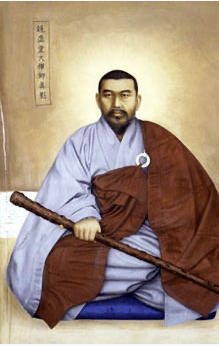Kyong Ho Seonsa:
(Hanja, Korea: 1849–1912).
Famous Korean Sŏn master, and the 75th Patriarch of Korean Sŏn. His original name was Song Tonguk; and his dharma name was Sŏng’u. He is known as the reviver of modern Korean Sŏn Buddhism. Song Tonguk was born in southern Korea (Chŏnju, Chŏlla province), and entered the sangha at the age of nine in 1857. He ordained at Ch’ŏnggye monastery located at Uiwang, in Kyŏnggi province. The young monk studied under the tutelage of Kyehŏ–sŏnsa. When he was 14, in 1862, Kyehŏ–sŏnsa disrobed and sent Kyŏnghŏ–sŏnsa to Manhwa–sŏnsa for further study at Tonghak–sa. Kyŏnghŏ soon distinguished himself as a sūtra-lecturer until a dramatic incident took place in 1879 while Kyŏnghŏ was travelling to Seoul to meet his previous teacher Kyehŏ–sŏnsa. On the way he entered a village looking for shelter from a rainstorm and discovered that every inhabitant of the village had died from an epidemic. Kyŏnghŏ came to understand that his knowledge of Buddhist sūtras did not help him with the issues of life and death. When Kyŏnghŏ returned to his monastery, he summarily dismissed all of his students and began serious Sŏn meditation practice. The kongan he worked with was Master Lingyun’s (771-853) “The donkey is not yet done and the horse has already arrived.” He suddenly understood the meaning of his kongan when he was reading the words, “Even though I should become a cow, there will be no nostrils.” Kyŏnghŏ attained enlightenment on November 15, 1887.

Don’t hope for a life without problems, because an easy life will make you lazy.
